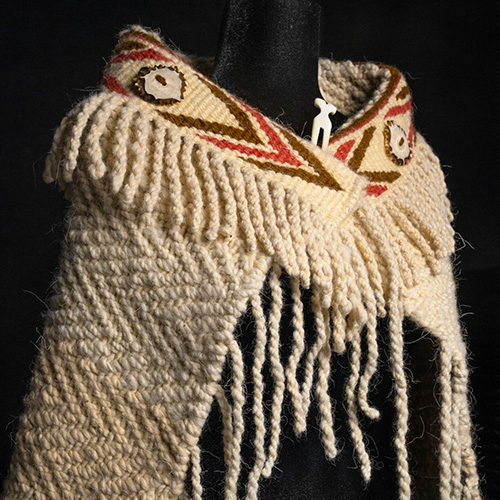Twenty teachers sit in a circle of chairs in the UW Music Building, each with a djembe — a goblet-shaped West African drum — in front of them. They focus intently on Thione Diop, a princely-looking artist-teacher who has joined them for 90 minutes of Wolof-style drumming from his native Senegal.

Diop, a master of djembe and other African percussion instruments, begins to slap, pat, and pound rhythms, first in a rush of sound and then in smaller bits. During his own silences, those small bits are played imitatively by the circle of drummers. After a nervous start, they are in sync. Diop then sings a short call and response. By the third round, the group sings the response to his call, again and again. With drumming and singing locked tightly together, Diop layers in a bold, free, and expressive solo of syncopations that punctuate on and off the pulse. He gives a sharp percussive signal at the wood sides of his master drum to bring the experience to a cohesive close. There are smiles, easy laughter, and high fives — something beautiful has transpired.
It’s a remarkable experience, to make music with these astounding musicians...
The drummers are educators attending a five-day course in world music pedagogy, offered each summer by the UW School of Music in partnership with Smithsonian Folkways, a Smithsonian Institution nonprofit record label that documents music from around the world. Course participants include middle school band teachers, language arts teachers, early childhood specialists, university music professors, and more. Some are sent to the course by their schools, but many come on their own, driven by a desire to know the music, the musicians, and the cultural meaning beyond the songs, dances, and instrumental works they experience. They understand the power of music to gain and maintain the attention of students, and they find music to be an important key to cultural understanding.

The UW envisioned the course and handles all logistics. Sessions are led by School of Music faculty, affiliate faculty, and visiting artists. In addition to guided listening of music from Smithsonian Folkways' extensive collection, there are hands-on activities like the session with Thione Diop. The educators play Trinidadian calypso on steel pans with Shannon Dudley, associate professor of ethnomusicology, who heads the UW Steelband. Phyllis Byrdwell, director of the UW Gospel Ensemble, leads them in gospel music. Patricia Shehan Campbell, professor of music, leads choral songs and dances from Bulgaria. Guest artists include an accomplished singer of Hindustani khyal — a vocal form of North India — and a specialist in Zimarimbas, a Zimbabwean-based marimba.
Percussion music is central to the world music pedagogy course. Both the recordings and live experiences feature the driving rhythmic energy of various drums, guitar strums, marimbas, steel drums, and gamelans. The educators discern differences between instrumental and vocal colorings, and they explore cultural reasons for the diversity of distinctive sounds. In this way, music serves as a gateway to cultural — and multicultural — understandings.
“We all want to be able to confidently teach our students about music from other cultures,” says Will Coppola, a former elementary school music teacher in New York City and current UW PhD student in music education, who attended the course this summer. “And while we can easily grab a book and read up on these musical traditions, watch videos online, and listen endlessly to clips on Smithsonian Folkways, there is really nothing quite like learning directly from the source by engaging with such expert musicians and teachers. It’s a remarkable experience, to make music with these astounding musicians, to see their nods of approval as you approximate the music they’ve devoted their lives to, and at the end of it all, to go home with your pedagogical tool chest overflowing with a newfound knowledge of musical cultures you previously knew nothing about."

In addition to hands-on activities with musicians, the course includes sessions on the pedagogy of world music cultures, facilitated by Campbell, Christopher Roberts, music education lecturer in the School of Music, and PhD alumna Amanda Soto (2012), now a professor at Texas State University. They cover aspects of world music pedagogy including attentive listening, vocal and instrument performance, dance, and the integration of music with other academic disciplines.
At the end of the week, participants leave the UW full of ideas for incorporating world music pedagogy into their own classes. Smithsonian Folkways shares about 100 music culture curricular units on their website, more than half of them designed by past participants of the world music pedagogy course. By connecting the dots between their own musical participation and pedagogy, they discover fresh approaches to lessons, lectures, and special projects with their students.
Many thanks to Patricia Shehan Campbell for her extensive contributions to this article. To learn more about the world music pedagogy course and how to apply for next year, visit worldmusicpedagogy.com.
More Stories

Bringing Music to Life Through Audio Engineering
UW School of Music alum Andrea Roberts, an audio engineer, has worked with recording artists in a wide range of genres — including Beyoncé.

A Healing Heart Returns
In February, the UW Symphony will perform a symphony that Coast Salish elder Vi Hilbert commissioned years ago to heal the world after the heartbreak of 9/11. The symphony was first performed by the Seattle Symphony in 2006.

Coast Salish Traditions are "Woven in Wool" at the Burke
A Burke Museum exhibit, co-curated by Coast Salish weavers and Burke curators, highlights the importance of weaving to Coast Salish communities.